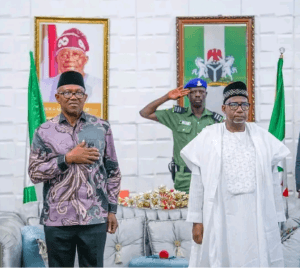I’m Ready to Work with Peter Obi for Vibrant Opposition – Bauchi Governor
By Ricky Awodi
Bauchi State Governor and Chairman of the Peoples Democratic Party (PDP) Governors’ Forum, Bala Mohammed, has declared his readiness to collaborate with Labour Party’s 2023 presidential candidate, Peter Obi, to strengthen opposition politics in Nigeria.
Mohammed made this known on Thursday after a closed-door meeting with Obi at the Government House in Bauchi, where both leaders discussed national issues and the future of opposition politics in the country.
Building a United Opposition
Speaking after the meeting, Governor Mohammed praised Obi’s political approach and deep understanding of governance, stating that his presence in the opposition had given Nigerians a credible alternative.
“We have a lot of respect and admiration for him because of his style of politics, his statesmanship, his versatile nature, and his deep knowledge of the economy and governance,” Mohammed said.
He further noted, “Peter Obi has a clear vision of where politics and politicians should be in terms of bringing good governance, impacting the people, and uniting the country. It is always a delight to listen to him because of his deep knowledge and mastery of statistics.”
Mohammed acknowledged that this was not their first meeting, revealing that they had also held discussions in Abuja regarding the challenges facing the opposition.
Addressing National Issues
The meeting covered key national issues, including the political crisis in Rivers State and the broader state of opposition in Nigeria. Mohammed stated that he was committed to working with Obi to provide a strong and knowledgeable opposition to the ruling party.
“I appreciate what he is doing as a leader of the opposition because, whether we like it or not, he is now the face of opposition politics in Nigeria,” he said.
Emphasizing the need for unity, he added, “We must come together to bring good governance, offer a vibrant opposition with vision and strategy, and rescue this country from mediocrities parading themselves as leaders.”
Mohammed hinted that other opposition governors were in support of the alliance, stating, “The time has come for us to step out and act with sincerity and focus. Our coming together is a message, and this message will resonate.”
Obi: Why I Met With Bala Mohammed
On his part, Peter Obi described his visit to Mohammed as part of wider consultations with key political leaders, particularly in the North, to address Nigeria’s challenges.
“Nigerians may wonder why I am here, but I have come to consult with him because he is a critical stakeholder in Nigerian politics,” Obi said.
He stressed the importance of the North in shaping Nigeria’s future, stating, “All of you know where we are today as a country. We must talk about the issues affecting the North because the North is a critical component in getting Nigeria on the right path.”
Obi also reiterated that tackling poverty was crucial to addressing insecurity.
“When people talk about criminality in Nigeria, especially in the North, I tell them the real issue is poverty. Until we address poverty, we cannot solve criminality,” he said.

He urged the government to prioritize education and agriculture as solutions to economic hardship and insecurity.
“But look at what dominates our political discourse today—budget padding, sexual harassment—while Nigerians are hungry. We need to discuss hunger, poverty, education, and healthcare,” Obi said.
Obi assured that his discussions with Mohammed were just the beginning of broader engagements on how to shape Nigeria’s political future.
A New Political Alignment?
Mohammed’s openness to working with Obi has fueled speculation about possible political realignments ahead of the 2027 elections. With the PDP struggling to mount a unified opposition and the Labour Party gaining influence, a strategic alliance could change Nigeria’s political landscape.
As Nigerians continue to debate the role of opposition in governance, this meeting signals a potential shift in political strategy—a move that could redefine the country’s power dynamics in the coming years.


